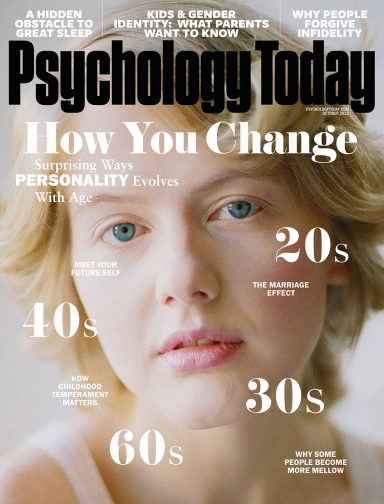Woody Allen's "You Will Meet a Tall Dark Stranger." A Good Movie about Death.
A Review Of Woody Allen's Latest: Go, Go Death.
Posted October 7, 2010
It's unfair that Woody Allen gets such bad reviews. He pumps out a brilliantly constructed parable every year, and critics feel the need to dump on him, perhaps because he was so loved in the 80's, and critics want to show their muscle in cutting down someone who's often been so praised.
David Denby missed the point in his review in this month's The New Yorker. He said that Allen's latest movie, You Will Meet a Tall Dark Stranger, was just another-of-the-same from Allen, a movie preaching that people are driven by "egocentricity and meanness," that no one's "satisfied with what he or she has" and that their efforts to improve their lives backfire. Yes, people in the movie are greedy and unhappy.
But the interesting piece is the reason why each person is greedy; and the admirable thing about Allen's movies over the last few years has been his willingness to think openly about issues that are clearly his own (inter-generational romance in Whatever Works and pending mortality in this latest) on a public stage. You Will Meet a Tall Dark Stranger is a movie about the anxious way in which an old man faces death. More, it's about the misguided ways in which we all deal with the fact that one day, as the writer Roy in the movie says, we're going to meet the "tall dark stranger" who is not a lover but the grim reaper.
Each character in the movie has some inkling that he's going to die and makes a crooked sprint away from the idea. They shoot in different trajectories like sparks from the firecracker; all are nuts but they're engaged in very human responses to mortality. If people in the movie, as Denby says, are mean, it's because people tend to get mean when they have even an non-conscious feeling that their lives are ending.
We learned this in a tidy way in a college psychology class in which we studied people's unconscious responses to death. When research subjects were even subliminally reminded that they were going to die-by seeing a quickly flashed image of a coffin, for instance-they got mean with people they considered their social competition. They fed those people more hot sauce, for instance, (apparently a sign of aggression), publically shamed them, or denied them money to an extent that they wouldn't do without the death prime. We are greedy when handling our anxiety about limits on our lives.
Allen's artistic brilliance in the movie comes through the way he shows the full range of anxious responses to death. At the center are Alfie and Helena, like aging night stars who shoot in diametrically opposite directions when the wife, Helena, reminds the husband, Alfie, that they are going to die. Alfie ends their long marriage and focuses on keeping his body from aging, devoting himself to the gym and taking a young, mindless lover. Helena handles reality by doing the opposite: focusing her attention on the afterlife and on disembodied, spiritual matters; she dates a fellow spiritual soul who looks like he doesn't have sex.
Then there's Roy, a writer, who wants to live forever by writing novels. When he sees the limitations in his talent that would keep him from historically lasting fame, he steals a novel from a dying man, to cheat his way into public memory. He goes through the entire movie in one outfit: the most boring tan you can imagine. And he falls in love with the woman who lives directly across from him, who appears throughout the movie in the one color that counterposes boredom, a fiery red. In this way and others (both are writers, one academic, one artistic; both are unhappy with having married conformists; she's young and on her way to fame, and he's falling away from the fame of his youth), they are twin stars cast in opposite directions.
Polarization is one way in which Allen links his different characters: Each presents a counterpoint to another. There's a color-based counterpoint in Alfie and Helena, too. Both appear throughout the whole movie in white outfits. Alfie's white comes to represent the medicinal sterility of his desire to live forever; Helen's white represents her growing affinity for the angels.
Allen puts a relatively rooted woman, Sally, near the center of the movie, but he also situates her between two polar opposites: her husband, the writer Roy who always dresses in tan, and a sexy gallery owner, Greg, who always dresses in a mysterious black. Allen was able to match actors here so that Roy (Josh Brolin) looks exactly like an a bloated version of Greg (Antonio Banderas), so it's as if Sally vibrates between weighty and ethereal versions of the same mate.
There are polarities everywhere, and they're each echoing the one big polarity in life: You're either alive, after all, or your dead, and that binary's irreversible.
That said, Allen laughs at people who try to escape that fact. One big kicker in the movie (what follows is a plot spoiler) is that with all this shutting between the big binary of life and death, we also run into a couple cases of the in-between. It turns out that Roy has stolen his novel from a man who he only assumed was dead but might in fact wake up from his coma; and Helena does her big battles in séances with the dead who continue to haunt the living. Of course Allen doesn't believe in the "almost dead," but he knows that the almost dead is the big dream. We all want to forget that death is final. Through this movie, Allen's just asking what daydreams and distractions are more opaque or useful than others are. You know he's asking these questions in his own life because of how deeply he asks them on screen. And, if his art is just another distraction, it's a distraction worth seeing.







